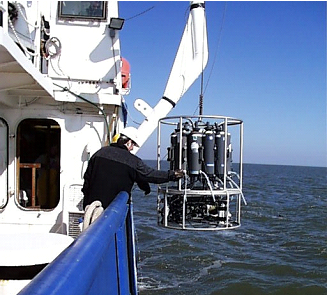NCCOS is working with the Northern Gulf Institute (NGI) and Gulf of Mexico State partners to develop a robust and sustainable Gulf of Mexico-wide monitoring program for hypoxia. At the 7th Annual Hypoxia Research Coordination Workshop, planning continued for a Cooperative Hypoxia Assessment and Monitoring Program.

The Cooperative Hypoxia Assessment and Monitoring Program (CHAMP) is a bottom-up effort comprised of State (LA, AL/MS, TX) and issue-based work groups. Eight work groups (Fisheries, Louisiana-Mississippi/Alabama-Texas state monitoring, autonomous vehicles, Hypoxia Task Force, Oil/Gas and Ocean Acidification, and Gulf Restoration) identify and pursue leveraging and support opportunities within their local focus areas, benefiting the entire Gulf region.
The 2016 6thAnnual NOAA/NGI Hypoxia Research Coordination Workshop, “Establishing a Cooperative Hypoxic Zone Monitoring Program” and the follow-up workshop proceedings paper led to the establishment of the eight work groups. The 2018 7thAnnual Workshop assessed prior workgroups progress in building the CHAMP program that advanced strategic planning to meet remaining programmatic and financial goals.
The workshop program achieves five products that satisfy the Mississippi River/Gulf of Mexico Hypoxia Task Force (HTF) management needs. These products address relatively straight-forward needs to answer more complex management questions. The simple products provide annual hypoxic zone size for monitoring progress towards the goal to reduce the size of the dead zone and for determining the relationship between nutrient reduction and the size for revising nutrient management targets. More complex products provide a holistic understanding of hypoxia in the Gulf where we have a clear understanding of the physical, biological, and chemical components that drive hypoxia, and where we have the ability to answer more complex questions. The more complex questions include what impact will diversions have on hypoxia, how will the zone change given changing ocean conditions, or what are the impacts on marine resources. At the workshop, work groups coordinated to ensure that all of the HTF research needs are met with sufficient monitoring; some monitoring needs remain.
The workshop outputs will include (1) a report identifying current monitoring components and key actions toward longer-term support, (2) an updated monitoring matrix highlighting key components of the CHAMP program, management value, and data, infrastructure and funding needs, and (3) initial outreach plan and outreach documents to promote the value of the CHAMP program.
The 7th Annual Hypoxia Research Coordination Workshop took place January 9–10, 2018, at the Mississippi State University Science and Technology Center at Stennis Space Center, Mississippi.
For more information, contact Alan.Lewitus@noaa.gov.
